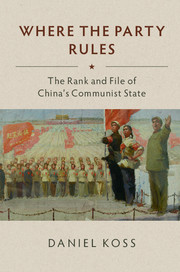Book contents
- Frontmatter
- Contents
- List of Figures
- List of Tables
- Acknowledgments
- PART I AUTOCRATIC GRASSROOTS POLITICS
- PART II THE PARTY IN CONTEMPORARY CHINA
- PART III THE PARTY'S ORIGINS
- PART IV THE PARTY IN THE MAO ERA
- 7 Can the CCP Disobey? The Great Leap Famine (1958–1961)
- 8 The CCP and Regime Survival in Times of Crisis (1967–1969)
- 9 Conclusion
- Appendix 1 Party-versus-Bureaucracy Model
- Appendix 2 Party Growth Model
- Notes
- Primary Material
- Secondary Sources
- Index
8 - The CCP and Regime Survival in Times of Crisis (1967–1969)
from PART IV - THE PARTY IN THE MAO ERA
Published online by Cambridge University Press: 21 April 2018
- Frontmatter
- Contents
- List of Figures
- List of Tables
- Acknowledgments
- PART I AUTOCRATIC GRASSROOTS POLITICS
- PART II THE PARTY IN CONTEMPORARY CHINA
- PART III THE PARTY'S ORIGINS
- PART IV THE PARTY IN THE MAO ERA
- 7 Can the CCP Disobey? The Great Leap Famine (1958–1961)
- 8 The CCP and Regime Survival in Times of Crisis (1967–1969)
- 9 Conclusion
- Appendix 1 Party-versus-Bureaucracy Model
- Appendix 2 Party Growth Model
- Notes
- Primary Material
- Secondary Sources
- Index
Summary
Under ordinary circumstances, local party members empower the regime by assisting in policy implementation, as Chapters 3 and 4 have demonstrated. But what if in a moment of crisis the party's ordinary chain of command breaks down, leaving local party cells with no instructions? Are local party organizations of any help in the hours of the regime's greatest need? To address these questions, this chapter focuses on the Cultural Revolution (1966–1976), an era when Mao Zedong, for fear of revisionism inside the CCP, called on people to “attack the headquarters” by overturning local party leadership. The movement brought China to the brink of anarchy. As a moment of existential crisis, the Cultural Revolution reveals how the party functions in emergency mode and brings to light the forces of order that ultimately prevailed. Whereas the previous chapters explain how an authoritarian party empowers the regime on an every-day basis, this chapter gives clues as to what to expect from the party when the regime is in crisis. Based on a large variety of documentary evidence, the analysis reveals the central role of the party for regime survival and identifies multiple mechanisms at work. Without the continued presence of the party at the local level, the People's Republic would have been unlikely to survive the turmoil.
To understand the durability of a party-based authoritarian regime, it is not enough to investigate its operations under favorable conditions. In the case of the Chinese party state, during the past three decades conditions have been very favorable indeed. Since 1983, in seventeen years out of thirty-two, China experienced double-digit economic growth rates. Furthermore, since 1997 state budgets have grown faster than the economy. The annual growth rate of fiscal revenues was 51 percent higher than the growth rate of the economy. The resilience of the Chinese party state has drawn much scholarly attention, but few political scientists study contemporary regime resilience with attention to the era when it was under greatest threat, namely at the height of the Cultural Revolution in 1967– 1968.
- Type
- Chapter
- Information
- Where the Party RulesThe Rank and File of China's Communist State, pp. 262 - 308Publisher: Cambridge University PressPrint publication year: 2018



